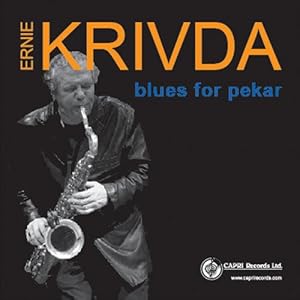Pianist Kenny Werner and saxophonist Ernie Krivda stand as two wonderful examples of just how big the jazz tent can be.
Werner, one of the most compositionally advanced modernists on the scene, also happens to possess great technical prowess. Still, a lot of his work is introspective, even ethereal and certainly provocative. Krivda, meanwhile, gives credence to the old adage that “everyone is from somewhere.” This has never been truer than in the case of this Cleveland-based talent who, at age 66, is one of the city’s favorite sons.
Krivda, who has spent the majority of his life in his hometown, is an expressive, extraverted player. Stylistically, he is a child of bebop — of the hard-driving, bluesy, swingin’ and sometimes frenetic pace of Charlie Parker, Dizzy Gillespie, Bud Powell, Max Roach and other musicians whose sound changed jazz forever, immediately following World War II.
Yet there is little doubt that were Krivda and Werner to be in the same room — or on the same bandstand — they would have one heck of a musical conversation. Jazz-wise, they speak, if not the same language, certainly one with serious overlap. This is one of the beauties of jazz, a point underscored in each man’s latest release.
Werner leads a dynamic and powerful quintet captured live at the Blue Note in New York. “Balloons” (Half Note), recorded in April 2010, was released this spring. Werner’s compositions are expansive and substantive, each one providing a voyage that houses a multiplicity of adventures. “Balloons” opens with the exquisite “Sada,” a free-floating modal fountain of cascading notes that is gentle as can be. It is the first of only four selections that constitute this more than 54-minute CD.
This star-studded unit includes four consummate professionals, bandleaders in their own right. Randy Brecker holds down the trumpet chair and shares the front line with saxophonist David Sanchez who, while still relatively young at 43, has become one of his generation’s important voices. His solo on “Sada” is simply Coltranesque yet his own. The rest of the rhythm section includes bassist John Patitucci, who blends second-to-none technique with soul, and drummer Antonio Sanchez, who is finally receiving recognition on his own having scored a bevy of primo gigs with the likes of Pat Metheny and, of late, as a member of Gary Burton’s “New Quartet.” The four Werner episodes that constitute “Balloons” cover a lot of territory. The title track is a nearly 18-minute ballad, while the date’s closing piece, “Class Dismissed,” shines a much more abstract light on Werner. Ultimately, though, it’s the caliber of playing and performance that carries the day.
The same can be said of Krivda’s “Blues For Pekar,” the title serving as an homage to the late Harvey Pekar, another of Cleveland’s cultural icons. Pekar, a Renaissance man of sorts, created “American Splendor,” a series of autobiographical comic books dating from the mid-1970s to 2008. Pekar, whose work had a sizable cult following, also wrote jazz-related criticism and articles for a variety of national publications. Krivda and Pekar were longtime friends.
Krivda’s latest effort would be characterized as “straight-ahead,” smacks of bebop’s constant energy and it’s great. On the one hand, it’s a throwback effort with wailing solos from an earlier era; on the other, the music sounds up-to-the-minute and right on time.
Krivda’s work here cuts across three generations and showcases the constantly evolving connection between Detroit and Cleveland. During the course of jazz history, there has been a great exchange between the cities, with players regularly crisscrossing the 170 miles between them. Krivda calls his rhythm section — pianist Claude Black, bassist Marion Hayden and drummer Renell Gonsalves, son of famed Ellington tenor saxophonist Paul Gonsalves — “The Detroit Connection.” Also heard on this disc is a pair of up-and-coming trumpeters: Dominick Farinacci and Sean Jones. Both are from northeast Ohio.
Throughout, Krivda’s tenor saxophone tone draws upon everyone from Ben Webster, Lester Young and Coleman Hawkins to titans such as Gene Ammons and Sonny Stitt and keystones Dexter Gordon and Sonny Rollins. Yet, Krivda, like Werner, brings originality to his band — whether interpreting Gordon’s “Fried Bananas,” Rollins’ “Valse Hot” or laying out his own pieces such as the title track and “One for Willie.”
Plans for a Sept. 18 memorial celebration of Lyle Harris are under way. Billed as a “Jam Session in Memory of Lyle Harris,” the event takes place at Mojo’s, 1013 Park Ave. The evening, which will feature an array of area talent, including one-time members of the late guitarist’s jazz quartet, begins at 6 p.m. and is free and open to the public. Harris, 77, died on July 2 because of complications from a stroke. He moved from Columbia to Springfield many years ago after having become not only a fixture on the local music scene here, but also decidedly one of the region’s most influential musicians. More details about the event will follow as they become available.Jon Poses


